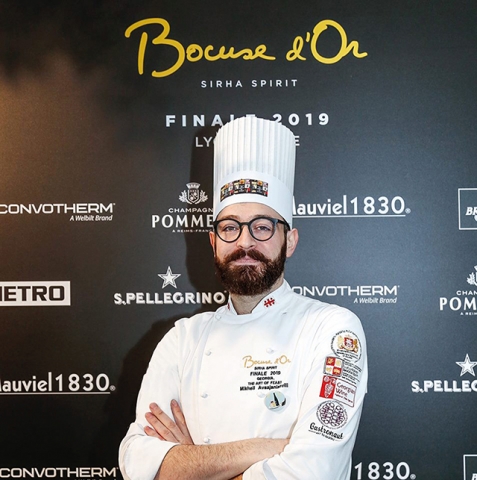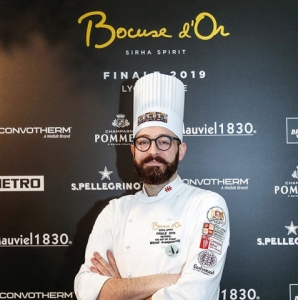Misha Avsajanishvili Judges the First Bocuse D’Or National Competition
Exclusive Interview
Misha Avsajanishvili is a Georgian chef working in Ukraine and the brand chef in 12 restaurants, a member of the Ukrainian Chefs Association, Associate Referee of the Culinary Championships, and a jury member of the culinary competition Kitchen Wars. Misha was also a jury member of the First National Contest of Bocuse d’Or Georgia that took place in ExpoGeorgia this past weekend.
In an exclusive interview with GEORGIA TODAY, the renowned chef talks about the significance and successes of the first-ever Bocuse d’Or Georgia.
“I was so pleasantly surprised with the quality we saw on the first day of Bocuse d’Or Georgia that when they served the first composition and I took a bite of it, I even teared up a little bit! I just couldn’t believe that this was happening in Georgia. I have been following the Bocuse d’Or contests since I was little, it is something like the Oscars ceremony for the people working in the field of gastronomy.”
How would you evaluate the quality of the dishes presented?
The quality was very satisfying. How the contestants would respond to the world standards of Bocuse d’Or was not the biggest issue this year, though. Nothing comes out ideal on a first try. The most important factor for this year’s competition is that Georgia has made the first steps. This precedent means that in a few years, Georgia will be on the world market of gastronomy. That doesn’t require too many years, now that we’re here. Our chefs will travel abroad and learn new techniques and in very little time we’ll reach a very high quality.
How would you compare the Georgian contestants to their international peers?
I attended the last Bocuse d’Or. The contestants there have six months to prepare for the contest. During this time, the teams prepare the same meal every day. Can you imagine that? That means that it takes them just seconds to make and decide. Our Georgian contestants had very little time to prepare for the competition. Considering this, the potential that we have seen here is astounding. I came across difficult preparation techniques that I had no idea were known in Georgia. Our expectations will be much higher for the next National Competition of Bocuse d’Or Georgia.”
During the first day of the contest, were the contestants equal in their capacities? Was it hard to decide among them, and did you have a favorite?
The contestants were pretty equal in their capacities and potentials. It was hard to score their works. It was hard for me because I wanted to write the relevant mark for each component so that even to myself I could give arguments as to why I scored it this way and not in any other. All the jury members, I’m sure, had the same conflict. We took our time to evaluate the food. As per rules, we didn’t tell each other what marks we gave for the different compositions, so we didn’t know if our favorites were general favorites. But I can tell you that my favorite from the first day of the contest came second in the competition!
Did you watch the 5.5 hour-long preparation process? Did you have any critical remarks there?
I followed the preparation process carefully. It wasn’t ideal and there were some mistakes but their results were very good. As I said before, the techniques they used to prepare the meat and garnishes were complicated and I was surprised to find the contestants were accustomed to them. Overall, I am very satisfied with their final works.
And what about the work and background of the chefs’ mentors?
I believe that the mentors for the chefs need to have some Bocuse d’Or experience. Either they have to have competed at the Bocuse d’Or themselves or to have coached a team for the contest. This is the usual process for Bocuse d’Or and it, of course, costs a great deal of money. If the country wants to develop, and develop this field of gastronomy in particular, it should be ready to fund this mentoring process.
What would you say about the involvement of the Georgian State?
We partly have their support, which is important, but not enough if we’re looking for development in this field. The Ministry of Agriculture supported us to make the first National Competition of Bocuse d’Or happen. In the countries that have competed at the Bocuse d’Or for years, the State pretty much organizes their national competitions- Spain, for example. This culture has to improve in Georgia. This year it was Levan [editor- SURNAME?] going door by the door asking for funds. With our limited funds, the organizing team achieved tremendous success.”
Overall…
Overall, there’s still some clichés and stereotypes in the field of gastronomy in Georgia, not only from the public but from those who are employed in the field. These clichés say that Georgia is a country of only khinkali and fast food… This contest, despite Georgia not having the best quality meat considering its climate and ranchland, gave results that prove that Georgia is so much more than that – we have the potential to be on the world market.
I work in Ukraine, and even my international, Ukrainian colleagues were astonished by the quality of the compositions. When I uploaded the pictures on my social media of the prepared food from the contest they replied to me, saying they were impressed with the works. What they don’t know is that the contestants had two weeks, some even one, to get ready for the competition.
We had the international members in the jury, and they were in complete shock. To achieve so much in such a short period and with so few resources - it’s not just that we have potential, we’ll soon be on the world market.
What are the expectations for the future in the field of gastronomy?
Our future is completely dependant on the sponsors. Where we go from here depends on the funding. I would like to address and encourage our government and representatives of the private sector to invest in this field as we have great potential, and Bocuse d’Or stands as proof of that. What they have to realize is that if they want our country to develop, they need to fund the development of the field of gastronomy. Our chefs need experienced mentors so they can study new techniques and represent Georgia at its best in Tallinn in May 2020.
What is the most important thing for you in cuisine?
The sense of taste is the most important thing for a chef. This means that when you’re cooking and you taste what you’ve made, you need to be able to tell what exactly and how much of it your dish is lacking. This is something one cannot learn – everything else is teachable.
What would you say about our winner? Does he have that sense of taste?
Very complicated techniques were used to prepare the dish that won the National Competition. As far as ideal things go, the winning composition was a masterpiece and pretty much ideal for the reality of Georgia.
By Nini Dakhundaridze











